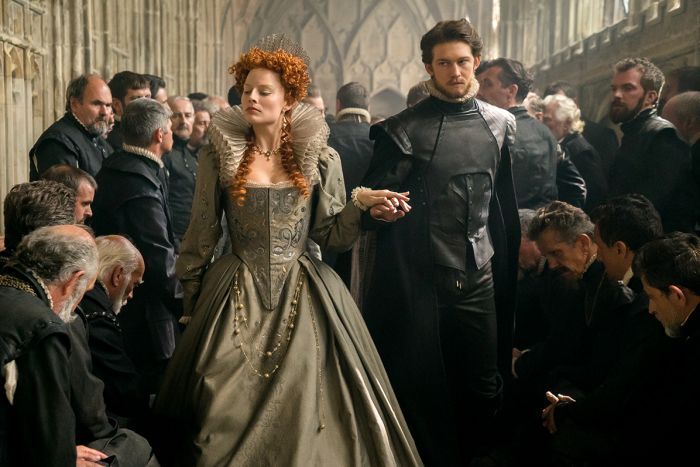Mary Queen of Scots
Starring Saoirse Ronan, Margot Robbie, Jack Lowden, Guy Pearce, Joe Alwyn, David Tennant
Directed by Josie Rourke
Reviewed by Michael Dalton
[rating: 3/5]
It’s a miracle Mary Queen of Scots, the debut feature by London stage director Josie Rourke, works as well as it does. With liberties taken to beat the band and updated to reflect the age we live in, it’s a beautifully acted, well-appointed look at the rivalry between the Elizabeth 1, a Protestant, and her daring and defiant Catholic cousin Mary Stuart. It has life though, a punch, and plenty of lust, murder, and betrayal. Rourke’s film tells the story of how Mary, who lost her French husband at 18 and then returned to Scotland in 1561, defied her cousin and co-ruled the land. We watch the tomboy-ish Mary astride her horse traverse the rolling mountains while back at the castle, Elizabeth sent entreaties of friendship, and even offered her own lover to Mary in an effort to see her married again. Instead Mary married her own cousin, Henry who, as it happens, preferred men in his chamber (at one point they shared a court musician). The result is ballyhoo followed by the birth of their child James followed by assassination. It should all make for a galloping affair but Rourke, who has an undeniably excellent eye for visual splendour, lets the material down. It’s finally too mechanical and crowded with characters that announce and proclaim.
What is bound to frustrate audiences is how unimaginatively composed the film is. A fractured narrative would’ve lent this history lesson some much needed suspense. Still, with the ethereal Saoirse Ronan as Mary (she gives the film a mighty charge and draws us in) and Margot Robbie as Elizabeth in the lead roles and David Tennant, Jack Lowden, and Guy Pearce (in the most horrendous wig you’ll see in a cinema this year) lending support, the action takes hold nicely, Max Richter’s grand score underpins the scenery and marries with John Mathieson’s sweeping cinematography to great effect, and there’s enougb manipulation and skulduggery to hold the enterprise steady. Rourke drives the point home that it is the men surrounding the ladies in question that lead to all the tragedy. The women use words while the men, who do not want a Catholic to take the throne, demolish. It’s their only response, and it’s a topical point.
Rourke valiantly illustrates the split factions as Mary and Elizabeth (so strong and assured was she, her advisors come off as secondary) write letters and plot but you rarely feel any connection between the two warring camps. Current award season champion The Favourite starring Olivia Colman, Emma Stone, and Rachel Weisz, another tale of betrayal and strife set in royal court, may be set in a different era but even with arthouse director Yorgos Lanthimos’s sucker punch approach, the course is steady. Here the strife feels wayward and unfocussed.




